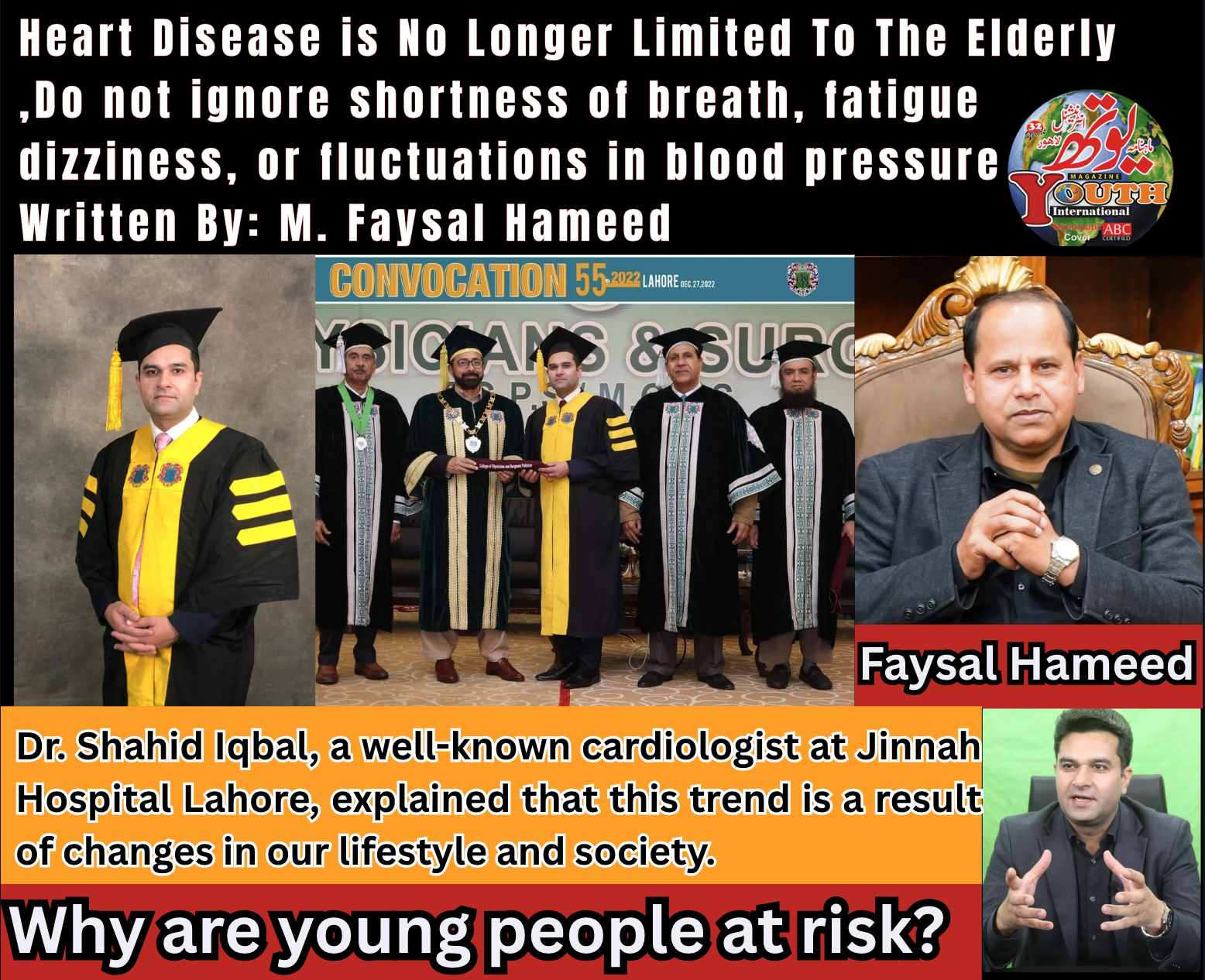Heart Disease is No Longer Limited to the ElderlyA conversation with Dr. Shahid Iqbal, Cardiologist, Jinnah Hospital Lahore

Conversation with Dr. Shahid Iqbal, Cardiologist, Jinnah Hospital LahoreThe increasing rate of heart diseases among young people is primarily due to unhealthy diets and unbalanced lifestyles. Smoking and the use of addictive substances significantly raise the risk of heart attacks in youth. Heaviness or tightness in the chest, pain spreading to the left arm, shoulder, neck, or jaw are important warning signs of heart disease. If parents or close relatives have heart disease, high blood pressure, or diabetes, the chances of the next generation developing these conditions increase.Heart disease is one of the leading causes of death worldwide. Today, it is not just a problem of older age groups—our younger generation is increasingly falling prey to this “silent killer.” Unhealthy eating habits, the growing trend of fast food, lack of exercise, mental stress, and smoking are causing heart problems to emerge at a very young age. Experts note that the number of young people suffering from heart attacks and blood pressure issues is rising alarmingly each year. Changing diets, reduced physical activity, stress, and substance abuse are worsening this situation. Heart disease not only affects individual health but also has serious economic and social consequences. Raising awareness and providing timely guidance is the need of the hour.Dr. Shahid Iqbal, a well-known cardiologist at Jinnah Hospital Lahore, explained that this trend is a result of changes in our lifestyle and society.Why are young people at risk?According to Dr. Iqbal, the root causes are poor diet and unhealthy lifestyles. Fast foods, bakery items, and soft drinks are consumed excessively by youth. These foods are high in fat and salt but lack nutrition, leading to cholesterol and blood pressure problems at an early age.He added that mobile phone and social media habits have taken youth away from physical activities. In the past, sports and walking were common, but now hours spent in front of screens are multiplying the risks of heart disease.Dr. Iqbal also pointed out that academic pressure, employment issues, and social demands are causing severe stress in young people. Persistent stress directly affects heartbeat and blood pressure. Sleep deprivation is another major threat, as most youth stay up late at night—a habit that harms heart health.He expressed concern over the rising use of cigarettes and drugs, warning that smokers are at a far greater risk of heart attacks. If this trend continues, society may face a severe health crisis in the coming years.Early symptoms of heart diseaseDr. Iqbal emphasized that young people must never ignore early signs:• Heaviness or tightness in the chest, sometimes spreading to the left arm, shoulder, neck, or jaw.• Shortness of breath while walking or climbing stairs, indicating heart weakness or blocked arteries.• Excessive sweating, especially with chest pain, may signal a heart attack.• Feeling unusual fatigue even after small tasks—or even at rest.• Rapid or irregular heartbeat (palpitations).• Sudden dizziness or fainting due to fluctuations in heartbeat or blood pressure.• Swelling in feet or ankles, often linked to heart failure.• Difficulty breathing when lying down.Many young people dismiss these symptoms as “gas” or tiredness, but they may be the first signs of heart disease.Is heart disease hereditary?Dr. Iqbal confirmed that it can be. If parents or close relatives suffer from heart disease, high blood pressure, or diabetes, the risk for the next generation increases—especially in families where heart attacks or artery blockages occurred at a young age. Genetic factors make arteries more vulnerable, but lifestyle plays an equally important role. By adopting healthy eating habits, regular exercise, and avoiding smoking, even high-risk individuals can significantly reduce their chances. Those with a family history must prioritize yearly medical check-ups.Treatment and preventionAt the early stage, medicines and lifestyle changes are usually sufficient. However, if artery blockages worsen, angioplasty or bypass surgery may be required. Major hospitals in Lahore provide these facilities, but prevention is always better than cure.Dr. Iqbal’s preventive advice for youth:• Eat a balanced diet and avoid fast foods.• Exercise or walk at least 30 minutes daily.• Quit smoking and addictive habits.• Maintain a healthy weight.• Get cholesterol, blood sugar, and blood pressure tests annually.• Sleep at least eight hours.• Manage stress through positive methods.Message by Dr. Shahid IqbalDr. Iqbal stressed that schools and universities must educate students about healthy lifestyles, and the media should also play a positive role in raising awareness. Heart disease develops silently, and by the time it is detected, it may already be too late. Young people must realize that this illness is no longer confined to the elderly. Without preventive measures, society could face severe consequences in the years to come.